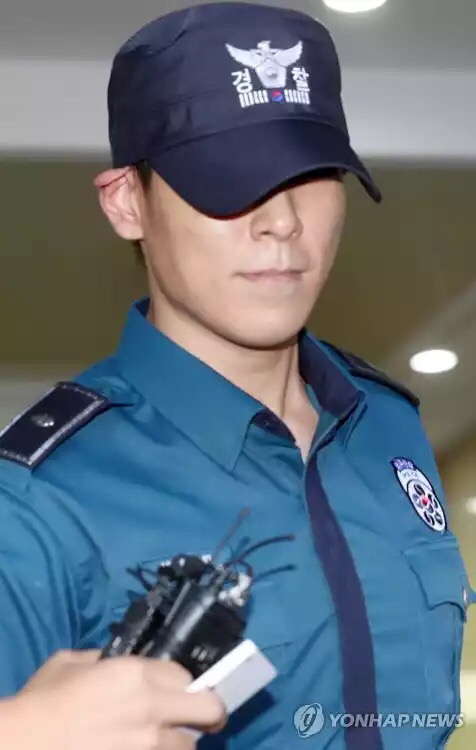
South Korean singer and actor T.O.P of boy band BIGBANG, who is serving his mandatory military service as a conscripted policeman, leaves his workplace in Seoul surrounded by reporters questioning his marijuana charges on June, 5, 2017. (Yonhap)
SEOUL, June 8 (Yonhap) — T.O.P, a K-pop star who has been hospitalized for an apparent drug overdose, was receiving intensive care for the third day Thursday, his agency YG said.
The company apologized for the singer’s marijuana scandal that sent a shock wave through fans.
“We deeply apologize to everyone who was let down and hurt by the string of disgraceful incidents involving T.O.P,” YG said in a statement.
The 29-year-old singer-rapper, whose real name is Choi Seung-hyun, was hospitalized Tuesday from an apparent overdose of benzodiazepine, a day after he was indicted without detention on charges of smoking marijuana.
T.O.P is suspected of smoking the banned substance four times with a 21-year-old would-be singer, only identified by her surname Han, at his home in Seoul in October last year.
After being sent to an emergency room, he is receiving intensive treatment for the third day in an intensive care unit, YG said.
“For not being able to rise up to your expectations, we will gravely acknowledge any blame,” YG said, adding that it will do its best to prevent similar incidents from occurring in the future.
Choi has been serving his mandatory military service as a conscripted policeman since February. He had worked at the Gangnam Police Station in Seoul but was transferred to a different police corps in eastern Seoul following his indictment.
His military service period will be put on hold until a court reaches a verdict. If he receives a jail term of 18 months or more, he will be dishonorably discharged from the service.
All able-bodied Korean men are required to complete at least 21 months of military service before the age of 35 in South Korea.
The use of marijuana is banned in South Korea and can be punished with a maximum of five years in prison or a fine of up to 50 million won (US$44,640).
Source: Yonhap

